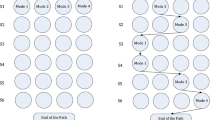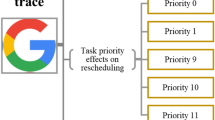Abstract
The recent development of telecommunication infra-structures such as the world-wide networks, interconnecting millions of computers spread all over the world, has made possible the coordinated use of a large amount of heterogeneous, weakly connected computational resources. This new area, known as Grid computing, is currently the focus of several research activities and projects. However, as in every new domain of research, in this one there are many unsolved questions, in particular those related to the management of the processing load inside the system. In this work, the problem of balancing processing loads on a Grid is approached by the introduction of the Generational Scheduling with Task Replication (GSTR) algorithm. A comprehensive set of simulations and tests is carried out in order to validate the proposed solution. A methodology for calculating and analyzing speed-up and efficiency ratios on heterogeneous groups of computers is also shown.
Similar content being viewed by others
Abbreviations
- GS:
-
Generational scheduling
- GSTR:
-
Generational scheduling with task replication
- PU:
-
Processing unit
- REP:
-
Relative estimated performance
- RRP:
-
Relative real performance
References
D.F. Baca, “Allocation modules to processors in a distributed system” IEEE Transactions on Software Engineering, SE–Vol. 15, No. 11, pp. 1427–1436, 1989.
C.A. Bohn and G.B. Lamont, “Load balancing for heterogeneous clusters of PCs,” Future Generation Computer Systems, Vol. 18, pp. 389–400, 2002.
B.R. Carter, D.W. Watson, F.R.F. Freund, K. Elaine, M. Francesca and H.J. Siegel, “Generational scheduling for dynamic task management in heterogeneous computing systems,” Journal of Information Sciences, Vol. 106, pp. 219–236, 1998.
J. H. Epenema, M. Livny, R. Van Dantzig, X. Evers and J. Pruyne, “A worldwide flock of condors: Load sharing among workstations clusters,” Future Generation Computer Systems, Vol. 12, pp. 53–65, 1996.
I. Foster, C. Kesselman, J. Nick and S. Tuecke, “Grid services for distributed system integration,” Computer, Vol. 35, No. 6, 2002.
A.S. Grimshaw and W. A. Wulf, “Legion—A view from 50,000 feet Los Alamitos, California,” in Proceedings of the Fifth IEEE International Symposium on High Performance Distributed Computing, Agosto, IEEE Computer Society Press, 1996.
E.J.H. Yero, F. de Oliveira Lucchese, F.S. Sambatti, M.V. Zuben and M.A.A. Henriques, “JoiN: The implementation of a Java-based massively parallel,” Grid Future Generation Computer Systems, Vol. 21, pp. 791–810, 2005.
J.H. Conway and R.K. Guy, The Book of Numbers, Springer, 1996.
Author information
Authors and Affiliations
Corresponding author
Rights and permissions
About this article
Cite this article
de O. Lucchese, F., Huerta Yero, E.J., Sambatti, F.S. et al. An Adaptive Scheduler for Grids. J Grid Computing 4, 1–17 (2006). https://doi.org/10.1007/s10723-005-9006-4
Received:
Accepted:
Published:
Issue Date:
DOI: https://doi.org/10.1007/s10723-005-9006-4




